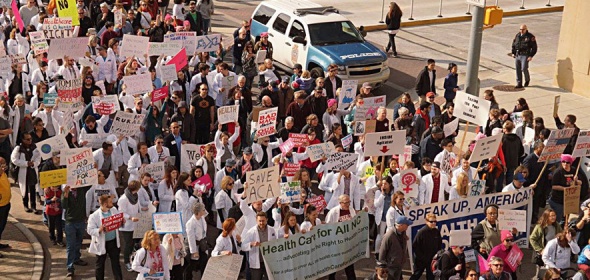Perri Morgan, PhD, PA-C, is professor and the director of research in the Physician Assistant Division in the Department of Community and Family Medicine at Duke University Medical Center. She is a practicing PA, specializing in hypertension, and an educator of PAs at Duke. In 2013 she, along with about 900 others, were arrested for protesting at the North Carolina state capitol where they advocated for Medicaid expansion in the state. We recently sat down with Perri to talk about the role of health professionals in political life.
Q: What inspires you to protest?
A: Traditionally, health care providers have followed an unspoken rule that they must stay out of controversy. But, while there are benefits to remaining apolitical in the exam room, patients really want to know what providers, doctors and administrators think could fix the system. I think we should step into that role. I come at it from a social justice perspective.
Q: Tell us about your movement in North Carolina.
A: We have a coalition movement in North Carolina of folks who agree on a lot of issues. We work together and organize protests that get political and media attention. We think we played a major role in turning our last governor out of office because we brought some of the things he was doing to public attention, such as denying Medicaid expansion. We stayed on that issue for four years. Public opinion tracking indicated that our activity played a big role in his low approval ratings, which ultimately led to his December 2016 loss.
Q: Why should health care professionals engage in advocacy?
A: I don’t think it should be a requirement, but for those who keep informed on policy and feel like they have something to contribute, I want them to feel like it’s a respected and positive thing to do. They can embrace their public role, meet with legislators, write op-eds and give speeches. I want to model that for others.
What do you think of the American Health Care Act in a nutshell?
A: The changes that are being considered almost uniformly favor people with more money and almost uniformly hurt people with less money. It doesn’t address things in the current system that control costs. It doesn’t fix the insurance market. It seems to be more of a political talking point about repealing Obamacare, rather than a real effort to improve health care, by which I mean improve access, improve quality and control costs.
Q: Where do you see signs for hope?
A: I’m hopeful for the longer term future. I think the level of civic engagement we’re seeing coming up now with many more people feeling the need to stand up and speak out will be good for our democracy in the long term. People will be less likely to be complacent and sit out midterm elections. I’ve seen a lot of energy coming out of students and trainees who want to enter the public sphere. They are standing up for up for the care for all patients.
Sign up to get updates on health workforce research insights, trends and leadership opportunities.
